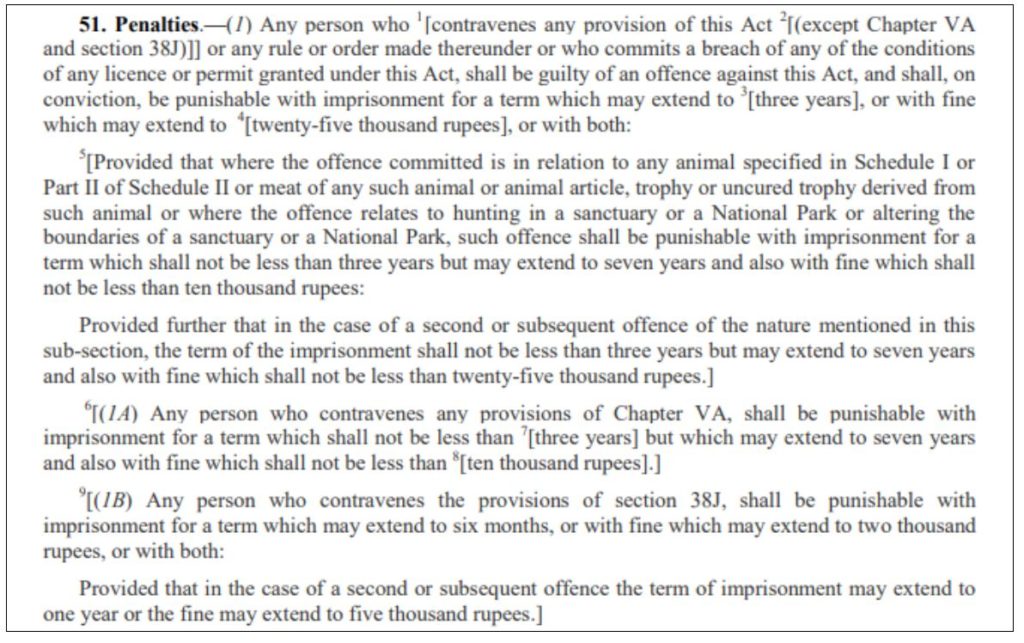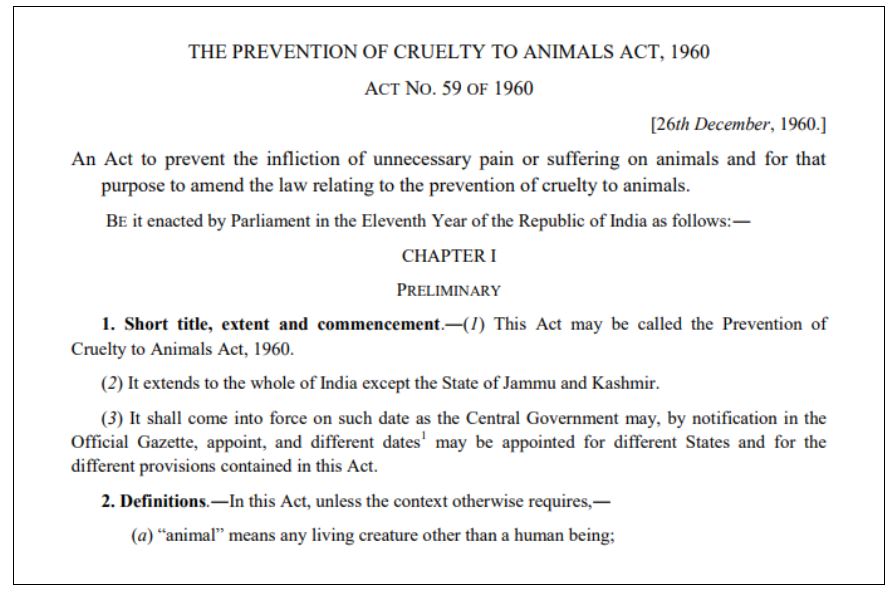While India enacted the ‘Prevention of Cruelty to Animals’ act in 1960, minimal penalties & lack of data have been the feature of its implementation. The government also acknowledged that the minimal penalties are not acting as a deterrent. However, there has been no serious effort to amend the legislation or even make the data available.
Article 51A (g) of the Constitution of India states that it is the fundamental duty of every Indian citizen to protect and improve the natural environment including forests, lakes, rivers, and wildlife, and to have compassion for living creatures. Nonetheless, numerous incidents of animal cruelty have been brought to light through social media in recent years. Brutal crimes against animals such as the death of a pregnant elephant that ate pineapple with explosives in it, dog beaten to death, puppies set on fire, dragging dogs tied to a scooter, rape of cow, and execution of monkeys are reported from across the country and have caught the social media by storm.
India has many legislations for protecting animals
Prevention of cruelty to animals has been listed in the Concurrent List which means both the Union and State Governments have the power to enact legislations in this matter. There are broadly three animal protection laws in India, viz. Section 428 & 429 of the Indian Penal Code (IPC), The Wildlife Protection Act of 1972, and Prevention of Cruelty to Animals Act, 1960. Besides the three, there are other laws such as The Performing Animals Rules,1973, The Transport of Animals Rules, 1978, and The Experiments On Animals( Control And Supervision) Rules,1968, which are specific to certain activities.
Section 428 and 429, IPC treats killing or maiming animals as a cognizable offence
Under Sections 428 & 429 of IPC, causing mischief by killing or maiming any animal worth ten rupees or more is a cognizable offence which fetches a punishment of two years in prison, a fine, or both. If any designated animal of any worth or that worth Rs. 50 or more is killed or maimed, the punishment is up to five years in prison and/or a fine.

Wildlife Protection Act deals with the protection of flora and fauna to ensure ecological security
The Wildlife Protection Act of 1972 aims to safeguard all plants and animal species in the country to ensure environmental and ecological security. The Act prohibits the hunting of endangered animals while providing for the establishment of wildlife sanctuaries, national parks, and zoos. According to Section 51of the Act, any person who contravenes any provision of the act shall be guilty of offences listed in the act and shall on conviction, be punishable with imprisonment for three years or fined which may extend to Rs. 25,000 or with both. The imprisonment term may extend to seven years in the case of offences against specific animals.
Prevention of Cruelty to Animals Act deals with captive and domestic animals
Prevention of Cruelty to Animals Act, 1960 (PCA) is a legislation that exclusively deals with captive & domestic animals. The objective of the Act is to prevent the infliction of unnecessary pain or suffering on animals, such as the incidents mentioned at the beginning of the story. The Act defines animals as any living creature other than a human being. It also defines what captive and domestic animals are, as the legislation is applicable to both these types of animals.
Chapter 3 of the Act lists out the different acts which are considered a cruel treatment of animals. These include physical harm such as beating, running over, tortures, load over, engagement in labour work despite sickness, administration of dangerous drugs, confinement in cages where animals cannot move about, not supplying adequate water, food, and shelter, abandonment in situations wherein the animal has to suffer, animal fighting for money, and keeping the animal chained for a long period of time. However, acts of dehorning cattle, nose-roping, castration, destroying stray dogs in lethal chambers or by other methods with minimal suffering or exterminating animals under legal authority, and preparing for human consumption, are exempted from the ambit of cruelty, provided it is done in the prescribed manner with minimal suffering and pain inflicted on the animals.
The act imposes a fine between Rs. 10 to Rs. 50 in the case of a first offence. This may extend up to Rs. 100 in case of subsequent offence within 3 years, and/or imprisonment for up to 3 months.
Animal Welfare Board of India was established under the Act
The Act also established the Animal Welfare Board of India (AWBI) for promoting animal welfare and for protecting animals from cruelty. The main function of the Board is to keep the law in force in India, adopt essential steps to improve the conditions of animals, and advise the Ministry of Fisheries, Animal Husbandry, and Dairying and governments for the enactment of rules under the Act. As of July 2021, AWBI has granted recognition to over 3,661 Animal Welfare Organizations across India. The board provides funds for maintaining animal shelters, medicines, medical equipment, and conducting veterinary camps, among other activities.
Though AWBI is an advisory body to Union and State governments, the implementation of statutory laws is the primary duty of the State government along with prevention, detection, registration, and investigation of crimes. AWBI writes regularly to States/UTs to ensure that cruel acts are prevented, and the provisions and rules are implemented.
AWBI, in its annual reports, provides details of the complaints received pertaining to animal cruelty in the country along with the action taken. The complaints received by AWBI are forwarded to the respective states/UTs to take the required action. Since 2014-15, a total of 1,901 cases have been forwarded to the states/UTs by the AWBI. The data is available up to 25 July 2021.
The latest data on cases booked under the Prevention of Cruelty to Animal act not available
The National Crime Records Bureau (NCRB) reports data on all types of crimes in the country through its annual ‘Crime in India (CII)’ report. It groups crimes under special & local laws (SLL) like the ‘Prevention of Cruelty to Animal act’ and does not provide data specific to crimes registered under each of these laws. Hence the latest year-wise data on the number of cases booked under the ‘Prevention of Cruelty to Animal act’ is not available. However, the government told the parliament in 2016 that as many as 7853, 14235 and 2265 cases were registered under this act during 2012-13, 2013-14 and 2014-15 respectively. A total of 11,950 persons were convicted in 2012-13, 20,164 in 2013-14, and 3,801 persons were convicted in 2014-15. It must be noted that data for many states was not provided in this parliament answer.
FIAPO’s report talks about the inadequacy of data
According to a report published by the Federation of Indian Animal Protection Organisations (FIAPO) and All Creatures Great and Small (ACGS), between 2010-2020, a total of 4,93,910 animals were involved in various incidents. This, however, does not mean all these animals were subject to cruelty. The report also states that most states were not recording crimes against animals and hence there is no data to analyse. The organization did secondary research through newspaper reports and other sources and compiled a few statistics.
The report mentions 720 cases of crime against street animals, 741 cases against working animals, 588 cases against companion animals, 88 cases against farm animals, and 258 cases against wild animals and birds. About 1,000 assault cases were documented which included 82 cases of sexual abuse, 266 cases of cold-blooded murder, and over 400 cases of violent attacks of beating, kicking, torturing, throwing acid or boiling water, maiming a part of the body, attacking with a knife or a blunt object. 20 of the documented cases were assault by children.
The government acknowledges that penalties in the PCA act are not acting as a deterrent
The Prevention of Cruelty to Animals Act is now a 60-year-old legislation with no major amendments in recent times. Monetary fines imposed for crimes against animals continue to be meager in the range of Rs. 10 to Rs. 100. This could be one reason the legislation has not been able to act as a deterrent to animal cruelty. The government also accepted in the Lok Sabha Government has received many suggestions, petitions, and requests from various sections of the societies to increase the existing penalties in the PCA act. In the same answer, the government acknowledged that penalties prescribed in the PCA Act are minimal and do not act as a deterrent.
A draft bill titled the Animal Welfare Act 2011 was proposed in 2011 to replace the 1960 law but could not make much headway. Further, multiple private member bills were introduced in the parliament including an amendment to increase the penalty. As with all the private member bills, none of them were taken up. Likewise, the 261st Report of the Law Commission had laid down some guidelines and listed suggestions in 2015, which have not yet been incorporated.
As noted earlier in this story, the lack of availability of the data on cases registered under the PCA act is another major issue as no analysis on trends is possible without data. Course correction & policy interventions also suffer because of the lack of data.
It is high time that India comes up with a legislation with stringent provisions to replace the PCA act. India must also ensure data on cases related to cruelty against animals is properly maintained and be made available by the NCRB or other agencies as is the case with other crimes. India can take a cue from countries like the UK where punishments include a lifetime ban from owning pets, a 51-week maximum jail term, and a penalty of up to £20,000.
Featured Image: Cruelty to Animals cases in India




